UPDATE: The contest ends on April 29th and they already passed the 30,000 start mark!
A reader sent me a note about a brain-a-thon Posit Science is running. You do brain training exercises and earn stars (points)  towards free subscriptions to BrainHQ for veterans with brain related inquiries. But you won’t be working alone. All your stars are added to those earned by others and if the total hits 10,000 Posit with donate 200 one-year subscriptions and if we hit 40,000 stars they will donate 500 subscriptions worth almost $50,000.
towards free subscriptions to BrainHQ for veterans with brain related inquiries. But you won’t be working alone. All your stars are added to those earned by others and if the total hits 10,000 Posit with donate 200 one-year subscriptions and if we hit 40,000 stars they will donate 500 subscriptions worth almost $50,000.
This is also a good way for you to try out some of the services for free. The brain training should help you focus attention, sharpen recall and process information faster. You get a brain boost and an opportunity to help veterans and their families. A good deal!
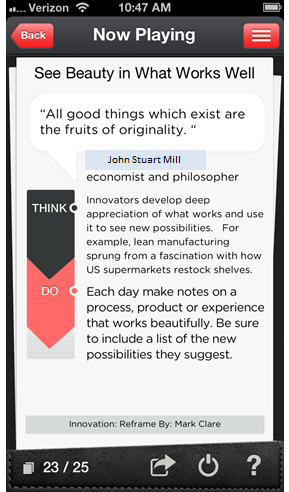 I recently completed a review of some of the best creativity techniques and innovation methods. My goal was to distill proven practices for improving creativity into a set of knowledge cards that could be used for brain training. Unlike most approaches to brain training, I did not want to create a game or some structured task to do on a computer. I wanted brain training “in the wild” or something that you can do along with your everyday activities and work efforts. That way you will see improvements in areas that matter. The result is a mobile brain training solution that runs on the iPhone, iPad and iPod touch:
I recently completed a review of some of the best creativity techniques and innovation methods. My goal was to distill proven practices for improving creativity into a set of knowledge cards that could be used for brain training. Unlike most approaches to brain training, I did not want to create a game or some structured task to do on a computer. I wanted brain training “in the wild” or something that you can do along with your everyday activities and work efforts. That way you will see improvements in areas that matter. The result is a mobile brain training solution that runs on the iPhone, iPad and iPod touch:

You can access the Reframe cards through NewHabits a free App that includes others decks on innovation and behavior change.
Play a card daily from your mobile device to experiment with and eventually master a proven creativity technique. Cards are designed to fit into everyday routines and take minutes to use. The Reframe cards work by converting general advice and complex how-to knowledge about creativity into right-sized chunks that are optimized for how we learn from experience.
The Reframe deck includes 25 cards. An example is shown to the right. Many of the cards assume you are working on a hard problem or innovation challenge that requires creativity. If you don’t have one pick a challenge from around the house – how to get the kids to do their homework or how to pick a wow gift for your spouse – and use that.
The deck includes a table of contents that makes it easy to manage and navigated the cards. You can share cards for free with friends via email, text messages, Twitter, Facebook and other means. For more information on how the App works check out the screen walk through.
Give the App a try and please comment on your experiences.
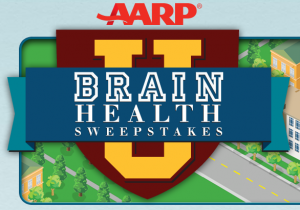 The AARP is sponsoring a sweepstakes designed to promote brain health. If you are 45 years or older you can sign up for free, learn about brain health and play various brain training games to compete. Games include memory match, private eye, split word, countdown and a brain teaser. You earn an entry for each level you complete and restrictions apply. You can also read library articles to earn entries if the games don’t appeal to you.
The AARP is sponsoring a sweepstakes designed to promote brain health. If you are 45 years or older you can sign up for free, learn about brain health and play various brain training games to compete. Games include memory match, private eye, split word, countdown and a brain teaser. You earn an entry for each level you complete and restrictions apply. You can also read library articles to earn entries if the games don’t appeal to you.
I hope they publish some data on the results once the contest is over. It will be interesting to see if this approach has a material impact on brain health.
I am interested to hear from readers that know about other brain health contests or sweepstakes.
Dementia tops the cost of cancer or heart disease!
 In the Next Brain Blog we focus on evidence-based techniques that help you maintain or improve brain function and cognitive performance at all ages. Nature gave us a hind brain, mid brain and fore brain, and it is now up to us to use the latest science, technology and proven practices to create our Next Brain. Neglecting our brain fitness, especially as we age can lead to bad outcomes just as neglecting our physical health can. We increase the chance of age-related cognitive impairment, dementia and even Alzheimer’s disease.
In the Next Brain Blog we focus on evidence-based techniques that help you maintain or improve brain function and cognitive performance at all ages. Nature gave us a hind brain, mid brain and fore brain, and it is now up to us to use the latest science, technology and proven practices to create our Next Brain. Neglecting our brain fitness, especially as we age can lead to bad outcomes just as neglecting our physical health can. We increase the chance of age-related cognitive impairment, dementia and even Alzheimer’s disease.
A new study makes this point dramatically:
“The monetary cost of dementia in the United States ranges from $157 billion to $215 billion annually, making the disease more costly to the nation than either heart disease or cancer, according to a new RAND Corporation study. “
This makes poor brain health a big factor in the US healthcare crisis. More motivation for sticking with our next brain development efforts and encouraging others to do so too!
Source: Image
Categories:
Cognitive Decline Tags:
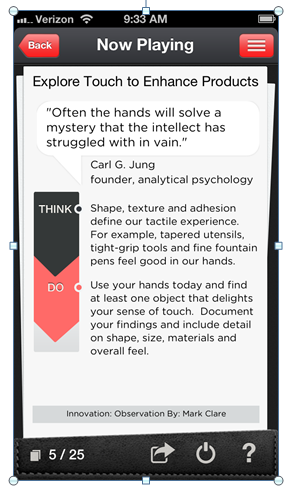 I’ve just launched NewHabits an iPhone and iPad App that delivers decks of flashcards for learning new skills and behaviors from experience. Each card in a deck explains what to THINK and DO to practice a new skill. All the cards are backed by research. You can play a card daily from your device. They take just minutes to use. As you play more cards the learning effects accumulate over time into significant new skills.
I’ve just launched NewHabits an iPhone and iPad App that delivers decks of flashcards for learning new skills and behaviors from experience. Each card in a deck explains what to THINK and DO to practice a new skill. All the cards are backed by research. You can play a card daily from your device. They take just minutes to use. As you play more cards the learning effects accumulate over time into significant new skills.
An example card from a deck for improving observation skills is shown to the right.
There are currently 7 decks in the NewHabits store, 2 are free and there are 6 more in development. Some relate directly to cognitive skills and should be of interest to readers of the Next Brain Blog, for example:
- Willpower: Science for maximizing self control
- Motivation: Science for maximizing the energy to act
- Observation: Use all five senses to deepen learning
- Reframe: Master advanced creativity techniques
- Interpret: Learn to make sense of experience
- Influence: Convince others to act on your ideas.
There is even a forthcoming deck on Brain Health: Achieve peak mental performance at any age. This deck will be written especially for readers of the Next Brain blog.
Many other decks are possible. I am actively looking for new or experienced authors interested in publishing skill-building decks on a royalty basis. Free training and support on how to create a deck is available.
If you use a Droid phone or tablet you can still get a detailed look at the App in a screen walkthrough.
I am interested to hear from readers that use the decks or want to create new ones. You can contact me directly at mark.k.clare@gmail.com or 260-433-7923.
Categories:
Software, Training Tags:
 A new study found that playing video games for an hour a day, five days per week, for a month produced significant improvements in a player’s ability to track multiple objects and complete visual search tasks. That is just 20 hours of using games that are a lot of fun.
A new study found that playing video games for an hour a day, five days per week, for a month produced significant improvements in a player’s ability to track multiple objects and complete visual search tasks. That is just 20 hours of using games that are a lot of fun.
Researchers looked at the effects of action games and non-action games. The games in the study included: Modern Combat Sandstorms. The Sims3, Bejeweled 2, Memory Matrix and Hidden Expedition Everest.
There are two important aspects of this study for readers of the Next Brain Blog:
- Gaming improves specific cognitive skills on small screens and works in the wild. Participants used their iPhones and did the training outside the laboratory in a real world setting.
- Non-action games, for example Sims3 and Memory Matrix showed some evidence of improving cognitive skills. While this is a preliminary result, it is important for those that don’t like violent games.
I am interested to hear how readers are using their mobile phones to play games or use other apps to improve brain function and cognitive performance.
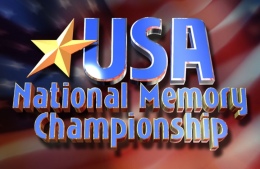 For 16 years there has been an annual contest to determine who in the USA has the best memory. There are seven events, including a poetry event, and 53 mental athletes registered to compete in 2013. The contest is taking place today!
For 16 years there has been an annual contest to determine who in the USA has the best memory. There are seven events, including a poetry event, and 53 mental athletes registered to compete in 2013. The contest is taking place today!
The BrainWorld blog has a good post about the 2012 champion who provides insights into his success. While none of the general advice will surprise readers of the Next Brain Blog (exercise, nutrition, social well-being and mental engagement), the specific technique for memorizing long lists of items is useful.
To use the technique you convert each item in the list into a picture that is meaningful and then place the pictures in order along a path or location that is familiar. For example, if memorizing a list of numbers you could translate each number into the jersey number of your favorite football player and then visualize each player in a specific room in your house. You can then recall the numbers by doing a mental walk through of your house and look at each player’s jersey.
I am interested to hear from readers that use specific memorization techniques.
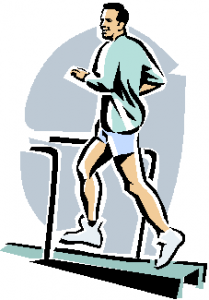 Here in the Next Brain Blog we have reviewed many studies that demonstrate the impact physical activity has on brain function and cognitive performance. For example:
Here in the Next Brain Blog we have reviewed many studies that demonstrate the impact physical activity has on brain function and cognitive performance. For example:
Instant Memory Boost from Six Minutes of Exercise
Tai Chi Boosts Brain Volume and Performance
Exercise Once Weekly Helps Avoid Mental Decline
Short Weekly Walks Improve Intelligence
to list a few. And if that is not enough to convince you to include physical activity as part of your brain training efforts, a review of multiple research studies presented at a recent meeting of the American Association for the Advancement of Science found:
“Dozens of studies now show that aerobic exercise can increase the size of critical brain structures and improve cognition in children and older adults.”
I am interested to hear from readers that use physical activity to improve brain function and cognitive performance. What activities do you do? How frequent do you do them?

An interesting preliminary study from the psychology department at the University of Arizona found that seniors trained to use Facebook showed measurable improvement in their cognitive abilities. More specifically:
“In the follow-ups, those who had learned to use Facebook performed about 25 percent better than they did at the start of the study on tasks designed to measure their mental updating abilities”
Mental updating is the ability to add and delete contents in your working memory. The study included a small group of seniors ages 68-91 with little or no prior Facebook experience. Participants friended only those in their group and made at least one short post daily.
Researchers believe that the constant information updating on Facebook and its relatively complex interface are responsible for the improvement. But more research is needed.
I am interested to hear from readers that use Facebook as a means to boost cognitive performance or maintain brain health.
 An interesting finding for parents looking to accelerated their kid’s brain development:
An interesting finding for parents looking to accelerated their kid’s brain development:
“A study published last month in the Journal of Neuroscience suggests that musical training before the age of seven has a significant effect on the development of the brain, showing that those who began early had stronger connections between motor regions – the parts of the brain that help you plan and carry out movements.”
The study found that the effect is strongest between the ages of 6-8 and that there appears to be no effect in adults.
Interested to hear from readers that are using music as part of their Next Brain development efforts.
 towards free subscriptions to BrainHQ for veterans with brain related inquiries. But you won’t be working alone. All your stars are added to those earned by others and if the total hits 10,000 Posit with donate 200 one-year subscriptions and if we hit 40,000 stars they will donate 500 subscriptions worth almost $50,000.
towards free subscriptions to BrainHQ for veterans with brain related inquiries. But you won’t be working alone. All your stars are added to those earned by others and if the total hits 10,000 Posit with donate 200 one-year subscriptions and if we hit 40,000 stars they will donate 500 subscriptions worth almost $50,000.









